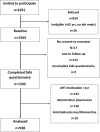Association between gaps in antihypertensive medication adherence and injurious falls in older community-dwelling adults: a prospective cohort study
- PMID: 30837246
- PMCID: PMC6429731
- DOI: 10.1136/bmjopen-2018-022927
Association between gaps in antihypertensive medication adherence and injurious falls in older community-dwelling adults: a prospective cohort study
Abstract
Objective: Growing evidence suggests that older adults are at an increased risk of injurious falls when initiating antihypertensive medication, while the evidence regarding long-term use of antihypertensive medication and the risk of falling is mixed. However, long-term users who stop and start these medications may have a similar risk of falling to initial users of antihypertensive medication. Our aim was to evaluate the association between gaps in antihypertensive medication adherence and injurious falls in older (≥65 years) community-dwelling, long-term (≥≥1 year) antihypertensive users.
Design: Prospective cohort study.
Setting: Irish Community Pharmacy.
Participants: Consecutive participants presenting a prescription for antihypertensive medication to 106 community pharmacies nationwide, community-dwelling, ≥65 years, with no evidence of cognitive impairment, taking antihypertensive medication for ≥1 year (n=938).
Measures: Gaps in antihypertensive medication adherence were evaluated from linked dispensing records as the number of 5-day gaps between sequential supplies over the 12-month period prior to baseline. Injurious falls during follow-up were recorded via questionnaire during structured telephone interviews at 12 months.
Results: At 12 months, 8.1% (n=76) of participants reported an injurious fall requiring medical attention. The mean number of 5-day gaps in medication refill behaviour was 1.47 (SD 1.58). In adjusted, modified Poisson models, 5-day medication refill gaps at baseline were associated with a higher risk of an injurious fall during follow-up (aRR 1.18, 95% CI 1.02 to 1.37, p=0.024).
Conclusion: Each 5-day gap in antihypertensive refill adherence increased the risk of self-reported injurious falls by 18%. Gaps in antihypertensive adherence may be a marker for increased risk of injurious falls. It is unknown whether adherence-interventions will reduce subsequent risk. This finding is hypothesis generating and should be replicated in similar populations.
Keywords: adherence; antihypertensive therapy; injurious falls; older adults.
© Author(s) (or their employer(s)) 2019. Re-use permitted under CC BY-NC. No commercial re-use. See rights and permissions. Published by BMJ.
Conflict of interest statement
Competing interests: None declared.
Figures


Similar articles
-
Impact of financial burden, resulting from prescription co-payments, on antihypertensive medication adherence in an older publically insured population.BMC Public Health. 2018 Nov 20;18(1):1282. doi: 10.1186/s12889-018-6209-8. BMC Public Health. 2018. PMID: 30458754 Free PMC article.
-
Use of Medications with Anticholinergic Activity and Self-Reported Injurious Falls in Older Community-Dwelling Adults.J Am Geriatr Soc. 2015 Aug;63(8):1561-9. doi: 10.1111/jgs.13543. Epub 2015 Jul 22. J Am Geriatr Soc. 2015. PMID: 26200894
-
The association between pharmacy refill-adherence metrics and healthcare utilisation: a prospective cohort study of older hypertensive adults.Int J Pharm Pract. 2019 Oct;27(5):459-467. doi: 10.1111/ijpp.12539. Epub 2019 Apr 10. Int J Pharm Pract. 2019. PMID: 30968988
-
A Systematic Review and Meta-Analyses of the Association Between Anti-Hypertensive Classes and the Risk of Falls Among Older Adults.Drugs Aging. 2018 Jul;35(7):625-635. doi: 10.1007/s40266-018-0561-3. Drugs Aging. 2018. PMID: 29936694
-
Association Between Chronic or Acute Use of Antihypertensive Class of Medications and Falls in Older Adults. A Systematic Review and Meta-Analysis.Am J Hypertens. 2018 Mar 10;31(4):467-479. doi: 10.1093/ajh/hpx189. Am J Hypertens. 2018. PMID: 29087440
Cited by
-
Variation in Mean Arterial Pressure Increases Falls Risk in Elderly Physically Frail and Prefrail Individuals Treated With Antihypertensive Medication.Hypertension. 2022 Sep;79(9):2051-2061. doi: 10.1161/HYPERTENSIONAHA.122.19356. Epub 2022 Jun 20. Hypertension. 2022. PMID: 35722878 Free PMC article.
-
Prevalence of potentially serious alcohol-medication interactions in older adults in a community pharmacy setting: a cross-sectional study.BMJ Open. 2020 Aug 30;10(8):e035212. doi: 10.1136/bmjopen-2019-035212. BMJ Open. 2020. PMID: 32868351 Free PMC article.
-
The State of Use and Utility of Negative Controls in Pharmacoepidemiologic Studies.Am J Epidemiol. 2024 Feb 5;193(3):426-453. doi: 10.1093/aje/kwad201. Am J Epidemiol. 2024. PMID: 37851862 Free PMC article. Review.
-
Risk of adverse events following the initiation of antihypertensives in older people with complex health needs: a self-controlled case series in the United Kingdom.Age Ageing. 2023 Sep 1;52(9):afad177. doi: 10.1093/ageing/afad177. Age Ageing. 2023. PMID: 37725973 Free PMC article.
-
Older People Living Alone: A Predictive Model of Fall Risk.Int J Environ Res Public Health. 2023 Jul 3;20(13):6284. doi: 10.3390/ijerph20136284. Int J Environ Res Public Health. 2023. PMID: 37444131 Free PMC article.
References
-
- Turnbull F, Neal B, Ninomiya T, et al. . Effects of different regimens to lower blood pressure on major cardiovascular events in older and younger adults: meta-analysis of randomised trials. BMJ 2008;336:1121–3. 10.1136/bmj.39548.738368.BE - DOI - PMC - PubMed
MeSH terms
Substances
LinkOut - more resources
Full Text Sources
Medical
Miscellaneous
